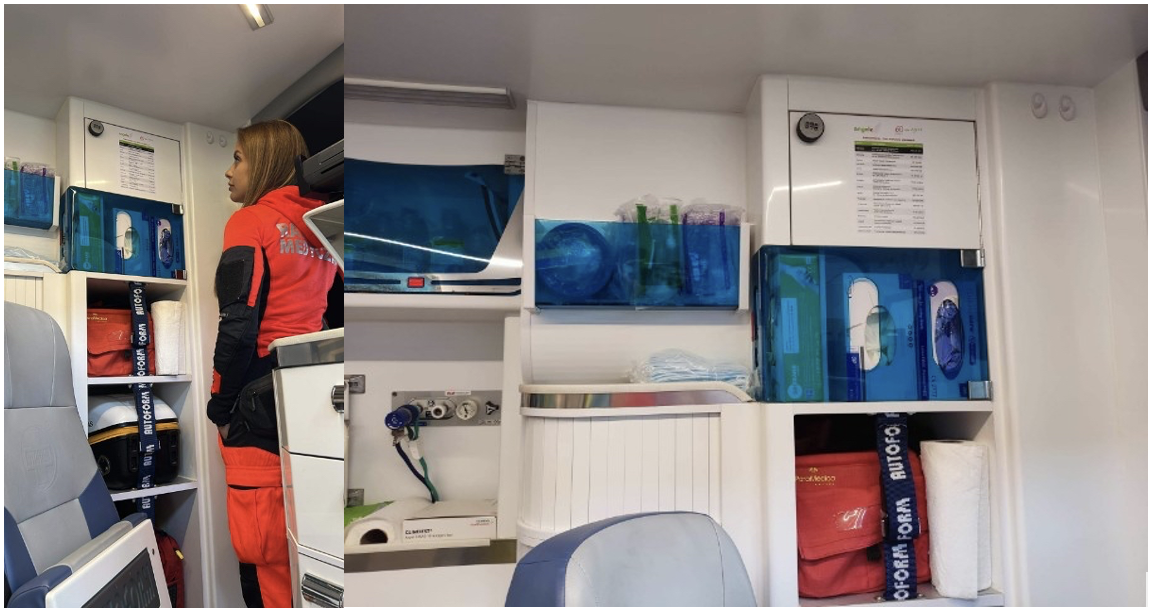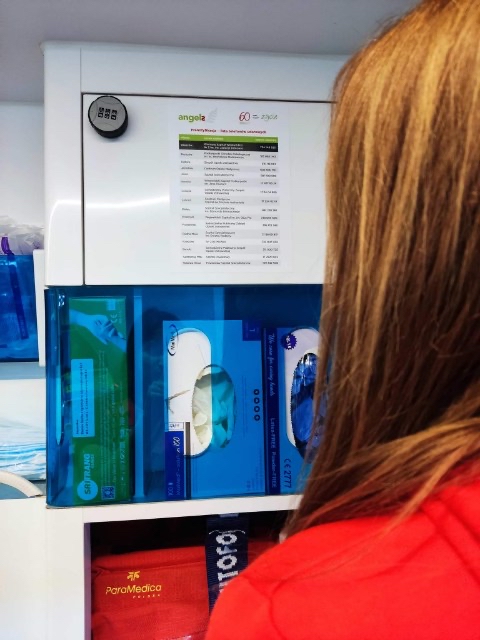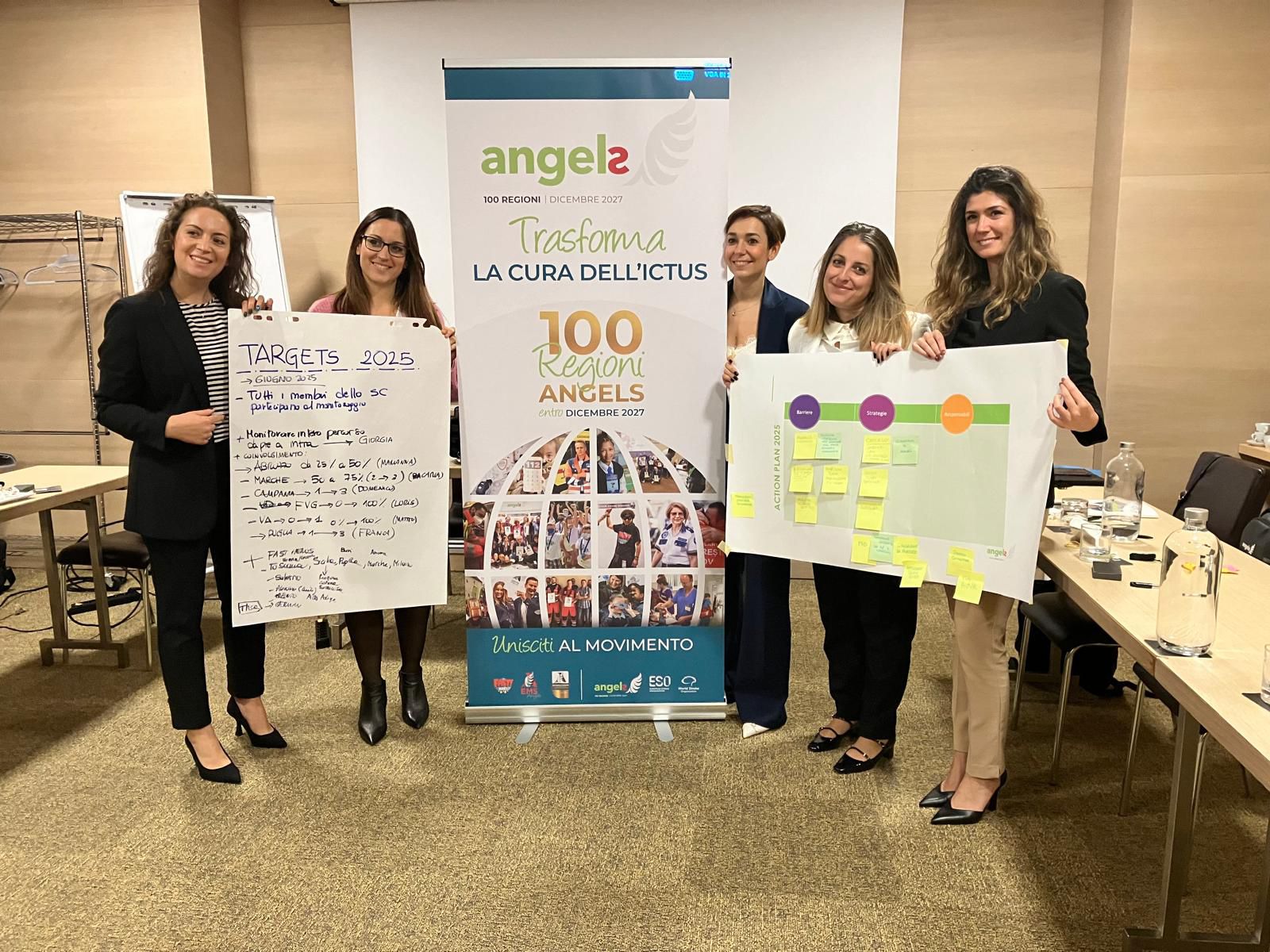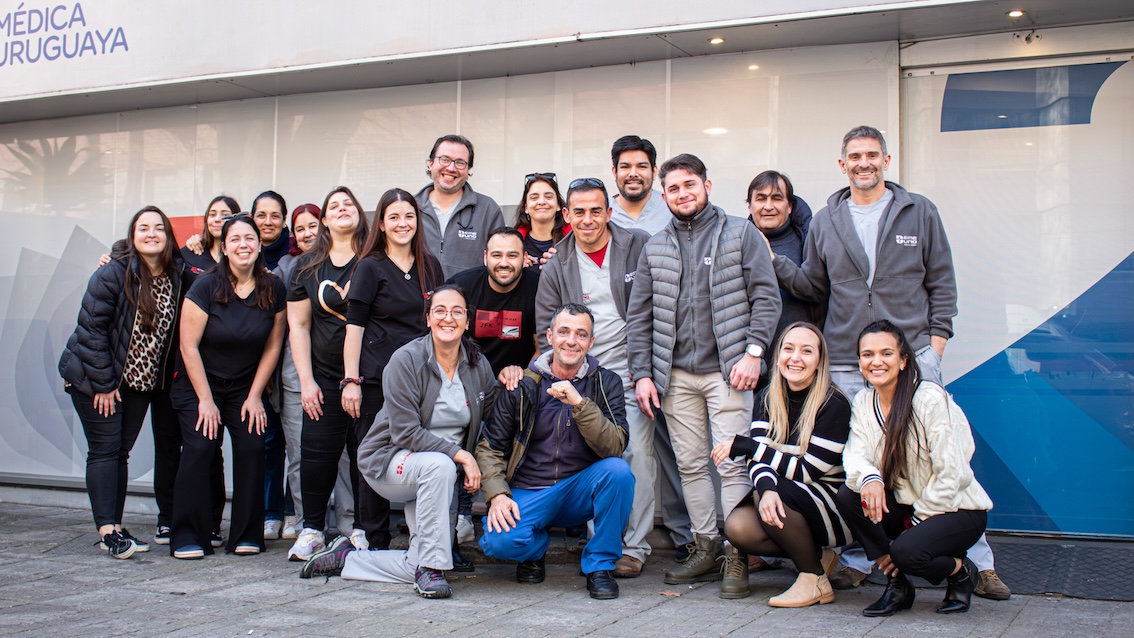
Si tratta di un normale bollino, alto circa 21 cm e largo 15 cm. Nell'angolo in alto a sinistra si trova il logo Angels; le parole "60 minuti = vita" appaiono in alto a destra, un elenco di 16 numeri di telefono di seguito. L’adesivo ha uno strato adesivo sottile che, quando si stacca il supporto, aderisce a quasi qualsiasi superficie, come ad esempio il pannello interno di un’ambulanza.
Infatti, è probabile che troviate degli adesivi esattamente come questo all'interno di ogni singola ambulanza di Podkarpackie, una provincia montana nell'angolo sudorientale della Polonia, dove la responsabilità per la gestione dell'ictus ricade su Prof Halina Bartosik-Psujek, che è il consulente neurologia per la regione.
Il 23 marzo di quest’anno il Prof. Bartosik-Psujek è stato lieto di accogliere i responsabili della neurologia di tutte le 16 ictus unit della provincia al primo incontro regionale faccia a faccia dall’inizio della pandemia. Avevano molto di cui parlare, compreso il fatto che i ritardi del trattamento emergenti dai dati regionali sullictus hanno evidenziato carenze nel servizio Servizi d'emergenza, in cui la prolungata crisi Covid aveva interrotto la formazione, aumentato il turnover del personale e ridotto il morale. Il personale dell’ambulanza in tutta la regione non aveva la capacità di diagnosticare lictus a meno che i sintomi non fossero evidenti; non era in uso alcuna scala di valutazione neurologica e la pre-notifica non era coerente.
Tra i diversi interventi che emergerebbero dalla riunione regionale (compresi i workshop sul processo decisionale, la formazione sulla simulazione e l’implementazione del protocollo FeSS), la formazione Servizi d'emergenza ha preceduto la priorità. A fine aprile, meno di quattro settimane dopo la riunione regionale, 60 membri del Servizi d'emergenza provenienti da tutta la regione si riunirebbero nella prospera capitale provinciale Rzeszów per due giorni di formazione intensiva.
Prima dell’evento, la Consulente Angels Katarzyna Putyuo ha trascorso molto tempo al telefono chiamando una serie specifica di numeri. Il feedback che aveva ricevuto dai servizi Servizi d'emergenza indicato che le chiamate ai telefoni ictus in alcune delle ictus unit della regione spesso non hanno risposto. Katarzyna aveva un inchiostro che il motivo potrebbe essere semplice, e quando un numero allarmante di volte che le sue chiamate sono andate senza risposta, ha raddoppiato durante il suo hunch: I numeri potrebbero essere sbagliati?

Una semplice spiegazione
L’idea che semplici spiegazioni siano generalmente migliori di quelle complesse è un principio di risoluzione dei problemi attribuito a William of Ockham, un matematico e filosofo inglese nato oltre 700 anni fa. "Rasoio di Ockham", come è noto il principio, ritiene che si debba appoggiarsi alla semplicità quando si costruisce una teoria perché le spiegazioni di lavoro eccessivo spesso portano lontano dalla verità.
Uno alla volta, Katarzyna ha chiamato gli ospedali della provincia di Podkarpackie per chiedere: "Qual è il Suo numero di ictus, quello in cui qualcuno raccoglie sempre?" Le risposte variavano. In alcuni ospedali, il cellulare per ictus era diventato inoperativo dopo che il finanziamento si è esaurito. In un ospedale di punta con un percorso di ictus straordinariamente organizzato, il reparto di neurologia si era trasferito in un nuovo edificio e il loro numero è cambiato.
Dopo aver verificato o aggiornato il numero di ogni telefono per ictus di Podkarpackie, Katarzyna applicò un altro ictus del rasoio di Ockham. "È varo fare di più quello che si può fare con meno", ha creduto il grande logico. Quindi, invece di inserire i numeri di telefono nell’ordine del giorno della formazione o ideare un nuovo processo per la diffusione delle informazioni aggiornate, Katarzyna ha ordinato abbastanza adesivi per ogni ambulanza nella provincia di Podkarpackie, e alcuni buoni da risparmiare.

Uno strumento e un grilletto
Dai sintomi dell’ictus e dai farmaci per il paziente alle scale neurologiche, la formazione fornita dal Dott. Rafal Kaczorowskidel Provincial Clinical Hospital n. 2 di Rzeszów ha trattato ogni aspetto della fase preospedaliera, inclusa una dimostrazione video del percorso del paziente con e senza pre-notifica. È stato un occhio aperto per i team il cui percorso termina solitamente in PS; sono stati colpiti dalla differenza che una singola telefonata poteva fare per una vita.
Ma se il video ha fatto il caso della pre-notifica, l’adesivo ha fatto ancora di più. Ha cancellato le barriere all’implementazione installando in ogni ambulanza nella provincia uno strumento e un fattore scatenante per un’azione che salva vite. Non solo avevano i numeri da chiamare direttamente a portata di mano, ma il messaggio sulla pre-notifica era impossibile da trascurare.
Al termine della formazione, Katarzyna è rimasta sorpresa di trovare se stessa il target di una coda di partecipanti che stava raccogliendo un adesivo aggiuntivo per un collega assente o di condividere i propri suggerimenti su come migliorare il servizio.
Con l’impegno di ogni team dei servizi d'emergenza per la pre-notifica e di ogni stroke unit per rispondere al telefono, Katarzyna è convinta che questa azione prioritaria chiave sia ora supportata da ogni punto di vista, compresi quelli del Dott. Kaczorowski e del Prof. Bartosik-Psujek, la cui reputazione formidabile dovrebbe essere più che sufficiente per scoraggiare la violazione.
I guadagni ottenuti grazie all’adesivo hanno già colpito il pompelmo, poiché diversi ospedali segnalano percorsi più lisci e tempi di trattamento migliori a seguito della pre-notifica. Tuttavia, per misurare realmente ciò che un adesivo può realizzare, è necessario tenere d'occhio i premi Servizi d'emergenza del prossimo anno e cercare le squadre di ambulanza della provincia di Podkarpackie tra i vincitori.



